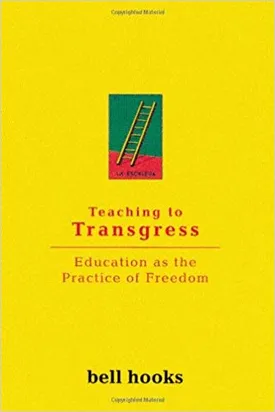Teaching to Transgress by Bell Hooks
Bell Hooks’ Teaching to Transgress: Education as the Practice of Freedom is focused on exploring the issues of education and how it affects power structures, racism and sexism. Hooks argues for education reform that moves away from oppressive forms of education, and toward education that “encourages student empowerment.” She believes that education should be used to challenge existing power structures and the racism, sexism and oppression embodied by them.
Hooks examines the traditional roles of education, dominantly lead by teachers, and the increasing distance between teachers and students. She believes that, traditionally, education is an oppressive system created by a white, male elite, and the purpose of education is to maintain the existing, hierarchical power structures. She argues that students are taught to conform to established, culturally sanctioned norms, and to accept oppression as “normal”. She believes that this form of education does not challenge racism and sexism, and in fact reinforces them.
Hooks provides an alternative form of education, one where teachers who “experience liberation as they teach” are at the helm. Hooks believes that this “liberatory education” can be beneficial to both teachers and students, as it encourages critical thinking and self-awareness. Such an education, Hooks believes, can help people challenge systems of oppression and facilitate liberation.
To bring about a liberatory education, the traditional roles of teachers must be radically reconsidered. Hooks recommends that teachers be facilitators, who work to draw out knowledge, create an open learning environment, and discourage conformity to patriarchal society. She believes this should be accomplished by providing students with the tools and space to explore, and by creating an atmosphere of trust, non-judgment and critical engagement between teachers and students.
Hooks emphasizes the importance of teachers' own selves and vulnerability in teaching, which she believes is an essential part of creating real relationships and meaningful learning experiences. By encouraging reflection and discussion, teachers can facilitate engagement, create an atmosphere of inclusion and mutual respect, and provide an authentic learning experience. She also argues that teachers need to recognize and challenge racism and sexism in the classroom, in order for students to gain meaningful knowledge.
Overall, Bell Hooks’ Teaching to Transgress: Education as the Practice of Freedom is an important and influential text that highlights the need for educational reform. Hooks’ arguments against education as oppressive and her alternative of liberatory education provide a necessary exploration of teacher and student roles, further reinforced by her discussion of the importance of teachers’ self-awareness and recognition of racism and sexism. Through her arguments, Hooks provides a powerful pathway to education reform that emphasizes student empowerment and liberation, and provides an authentic learning experience.

